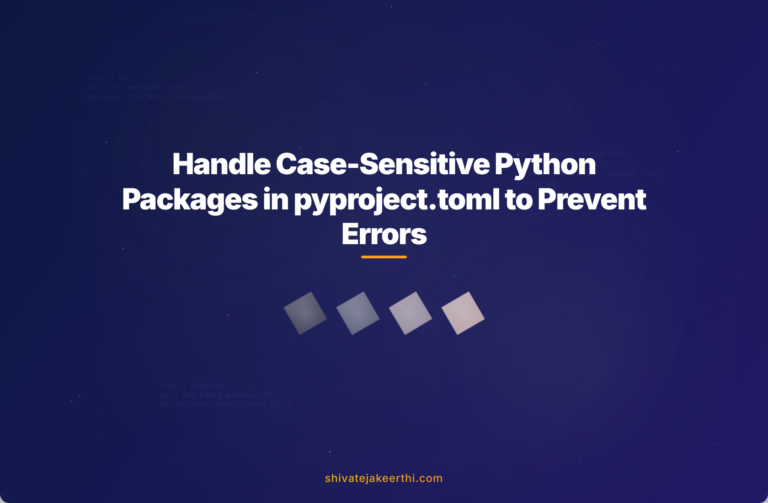When developing Python projects, managing package dependencies accurately is crucial. Developers often hit a snag when dealing with case-sensitive packages like modAL. If the package name isn’t declared correctly in your pyproject.toml, installation errors can disrupt your workflow. Understanding how to handle case-sensitive names helps prevent confusion and ensure smooth deployment of your Python applications.
Python’s package names, by convention, are usually lowercase. However, sometimes, the original package maintainers choose unique capitalizations such as modAL. Package naming conventions, established by the Python community, typically normalize names to lowercase on PyPI, but this normalization isn’t foolproof. A wrongly capitalized package entry in your dependency list could lead to installation problems or accidental installation of unintended packages.
Improper casing affects the way your build tools interpret package requirements—and that’s especially critical if you’re incorporating machine learning packages like modAL. This package—popular in active learning setups—features distinctive uppercase letters. Here’s what you should do to avoid issues with casing:
Best Practices for Adding modAL as a Dependency
Properly declaring modAL and similar packages in your pyproject.toml requires a bit more attention to detail than standard lowercase packages.
Manually Installing modAL
Start by manually installing the package locally first. This ensures that you clearly understand the correct package name and version.
- Open your terminal or command prompt.
- Activate your Python environment or virtual environment.
- Run the install command directly using pip:
pip install modAL - Confirm installation with a quick import test within Python:
import modAL
If no errors appear, your manual installation succeeded, confirming the accurate casing.
Creating a Workaround for Case-Sensitive Packages
To avoid any confusion with case-sensitive packages, always clearly encapsulate the package name while adding to your pyproject.toml.
- Use quotes to encapsulate package names explicitly:
[tool.poetry.dependencies] python = "^3.10" "modAL" = "^0.4.1" - Double-check that your package name matches exactly with the PyPI repository entry, including upper-case letters. Usually, a mismatch leads to installation errors or downloading incorrect packages.
Leveraging Tools and Resources
For those utilizing tools such as Poetry, these automations help manage package capitalization without excessive manual intervention. Tools like Poetry automatically handle most normalization but may still need your intervention for certain unique naming conventions.
- If encountering inconsistencies, try exploring alternative package management strategies such as utilizing constraints files with pip.
- Keep your poetry.lock and pyproject.toml up-to-date to avoid discrepancies between package installations.
Advanced Techniques for Handling Case-Sensitive Dependencies
While basic solutions work in most environments, sometimes your package dependencies become more complicated. This might involve integrating modAL with other similar packages, which can introduce conflicts.
Customizing the Installation Process in pyproject.toml
In advanced scenarios, you might need to specify granular configurations within your pyproject.toml file. An example could include directly specifying dependency sources or adjusting package grouping:
[tool.poetry.dependencies]
python = "^3.10"
"modAL" = {version = "^0.4.1", extras = ["full"]}
This structure explicitly notes extras, clearly specifying the exact package version, which helps avoid ambiguity.
Integrating modAL Seamlessly with Other Packages
Skillfully combining modAL with other ML frameworks—like scikit-learn or TensorFlow—can present package conflicts if naming convention issues arise. Always ensure each package in pyproject.toml precisely matches their PyPI counterparts, checking regularly for casing differences and adjusting your dependencies to match updates.
Ensuring Long-Term Compatibility
Managing dependencies doesn’t end after installing once. It involves consistent monitoring and updating.
- Periodically check your dependencies through package managers or automated tools, such as Dependabot.
- Review regular updates on package maintainer websites, forums, and pages like modAL’s Github repository.
- Schedule updates to ensure you catch breaking changes earlier rather than later.
Real-World Scenarios and Practical Examples
Suppose you’re building an active-learning pipeline. Your project heavily integrates modAL alongside scikit-learn. At some stage, a team member erroneously types all lowercase as ‘modal’ instead of ‘modAL’, inadvertently installing an entirely different unrelated package from PyPI, breaking your code during deployment.
In such scenarios, careful package verification and testing steps should be employed:
- Always run a quick, simple Python import test after installation.
- Ensure automated tests are integrated within your CI/CD system, catching such discrepancies early.
Adhering to tutorials, documentation, or community best practices also helps minimize mishaps—together with using robust testing frameworks such as pytest.
Summary of Best Practices and Recommendations
Effectively managing case-sensitive package dependencies can substantially streamline your development and deployment process. The main takeaways include:
- Always manually verify the exact package casing (modAL, not modal) before managing dependencies.
- Leverage modern tools like Poetry, which aid in dependency management correctly.
- Use quotes explicitly when declaring unique-cased packages in pyproject.toml.
- Regularly update and verify dependencies and utilize automated alerts.
Developing the practice of strict dependency management early pays dividends later in your software lifecycle. Properly handling nuanced details such as package casing significantly contributes to project stability and reliability.
Have you faced similar challenges while managing case-sensitive dependencies in Python? Share your experience or recommended techniques below—let’s tackle Python packaging together!



0 Comments